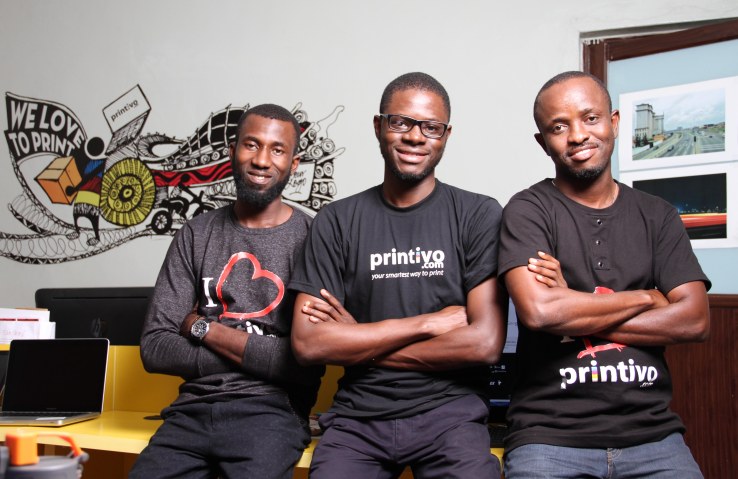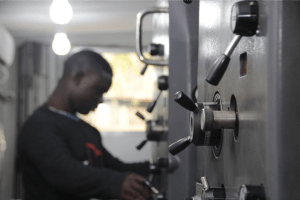
Printivo founders Ibukun Oloyede, Oluyomi Ojo, and Ayodeji Adeogun
Vistaprint has been around for twenty years, so if you live in the U.S. or Europe, ordering printed material online might not seem like a big deal. In Nigeria, however, getting business card and flyers are still a pain that requires multiple visits to a brick-and-mortar shop, says Printivo founder Oluyomi Ojo.
Ojo has family members who work in the printing industry, but he didn’t realize how complicated it is to handle orders until he became a managing director at an ad agency, especially for customers outside of Lagos, one of Nigeria’s printing hubs.
“Small businesses are not really catered to. If you want to print a quantity as low as 100 business cards, you might have to travel two hours to a print shop, sit down and have someone design them, then come back in a week and pick them up,” says Ojo.
“We saw there are a lot of problems for small-scale businesses that want to order print marketing. It’s a huge opportunity for us because there are more than 17 million small businesses in Nigeria alone.”
 Founded in 2013 by Ojo, Ibukun Oloyede, and Ayodeji Adeogun, Printivo ships express orders throughout Nigeria and will expand to other English-speaking African countries after landing seed funding from EchoVC Partners earlier this month. In addition to business cards, flyers, and stationery, Printivo also produces tote bags, mugs, and wedding favors.
Founded in 2013 by Ojo, Ibukun Oloyede, and Ayodeji Adeogun, Printivo ships express orders throughout Nigeria and will expand to other English-speaking African countries after landing seed funding from EchoVC Partners earlier this month. In addition to business cards, flyers, and stationery, Printivo also produces tote bags, mugs, and wedding favors.
There are other online print businesses in Nigeria, including PrintSharply and InstantPrint, but Ojo says Printivo differentiates by offering a larger selection of products and templates created by its full-time graphic designers (customers can also upload their own designs to the site). Ojo claims that Printivo’s tech platform lets users create and order printed goods in as little as 10 to 15 minutes.
“It takes away the weeks and days of calling and finding graphic designers and printers,” he says. Shipments within Lagos usually take two to three days, while orders reach the rest of Nigeria in about five days.
Along with launching in new markets, Printivo will expand its business model by launching an online marketplace for graphic designers, as well as a service similar to CafePress that will handle orders for companies that want to sell custom goods. The startup also has a B2B segment, focusing on larger companies; Ojo says clients so far have included Google, DHL, and telecom Etisalat.
While Nigeria’s Internet penetration rate is one of the highest in Africa (and still growing rapidly), Ojo is not worried that companies will began rejecting printed products in favor of online marketing campaigns.
“Print gives you a level of tangibility that online cannot give,” says Ojo. “People get to feel and touch your materials and that really drives growth here.”
Nigeria-based Printivo Wants To Become The Vistaprint Of Africa
